These 12 Innovations are Shaping the Future of Palliative Care

This month, for the first time in six years, colleagues and friends gathered in Philadelphia for the CAPC National Seminar for three days of learning, connection, and collaboration.
In addition to didactic sessions and workshops, 129 teams presented their projects at a poster session on September 16th. Of these, 12 were honored with Special Recognition for their innovative approaches, creative resource utilization, and promising outcomes poised to drive progress in the field. Poster projects and initiatives ranged from localized team-based quality improvement to system- or state-level collaborations.
Through this blog, we aim to spotlight the resourcefulness demonstrated within the palliative care community—and offer a source of inspiration for other programs. The projects described below fall under four domains: Equity/Accessibility, Technology/Data-Driven Care, Quality/Systems Improvements, and Education/Workforce.
From Barriers to Bridges: Expanding Access to Palliative Care
Scaling Pediatric Palliative Care Through Value-Based Innovation
Access to outpatient pediatric palliative care (PPC) is limited, based in part on a mismatch between time-intensive interprofessional services and fee-for-service payment. Imagine Pediatrics is utilizing a value-based care (VBC) model, which better aligns with the goals of PPC to improve quality and reduce utilization. The team analyzed claims data for more than 20,000 children with complex conditions. Utilizing CAPC’s Pediatric Palliative Care Referral Criteria, almost 20% of the children were identified as likely to benefit from PPC. In response, Imagine Pediatrics launched a virtual and in-home PPC program, which has been active for 18 months, with strong caregiver satisfaction and early signs of reduced health care utilization and costs. This initiative highlights the potential for VBC to support scalable, community-based PPC. The team is committed to ongoing evaluation to explore and overcome challenges to this model, such as virtual care limitations and regulatory barriers.
From Isolation to Integration: Progress in Palliative Care in Rural Settings
As noted in CAPC’s 2024 Serious Illness Scorecard, rural communities face major barriers in accessing palliative care, with only 34.5% of rural hospitals reporting a palliative care program compared to 81% in urban settings. To address these unique barriers, the Washington State Rural Palliative Care Initiative (WRPCI) was launched in 2016 as a public-private partnership led by the State Department of Health. WRPCI supports rural health systems in integrating palliative care through community-driven action plans, clinical mentoring, and a Learning Action Network (LAN) that promotes collaboration and shared problem-solving. WRPCI membership has tripled since its launch, now up to 24 communities, with participants reporting lower emergency department visits and hospitalizations, reduced isolation, and improved access to resources. The WRPCI model empowers rural communities to develop and deliver meaningful palliative care services despite limited infrastructure.
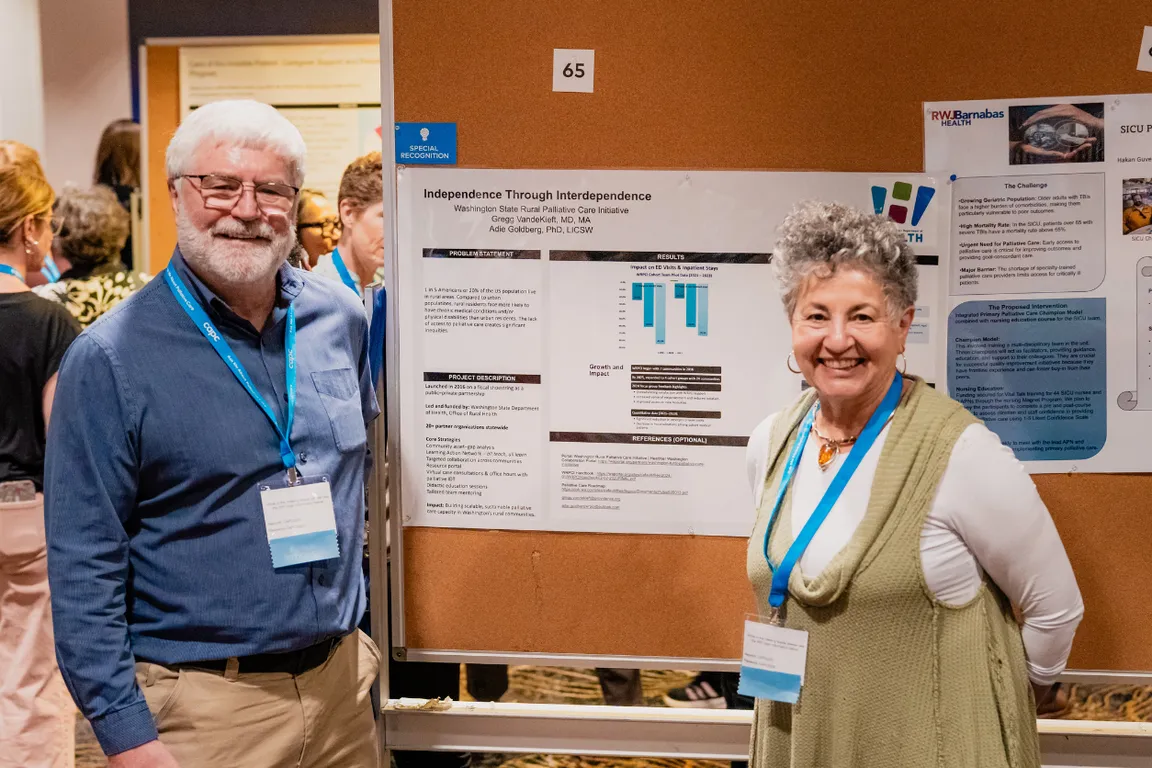
Using Data to Drive Timely Palliative Care Consultations
To address delayed palliative care initiation for patients with congestive heart failure (CHF) and chronic obstructive pulmonary disease (COPD), Sentara Health piloted an early referral initiative at two hospitals in Virginia. Using the Charlson Comorbidity Index in the electronic health record (EHR), high-risk patients were identified for palliative consultations, leading to a 60% increase in referrals. The success of the pilot led to a system-wide rollout across nine hospitals, making the case for the hiring of six new advanced practice providers (APPs) and the integration of consults into admission order sets. With this improvement, monthly palliative care consultations increased by 64%, with less time to referral and early signs of improved readmissions and length-of-stay metrics. By educating internal teams, refining workflows, and securing leadership support, the Sentara Health team was able to overcome barriers, drive sustainable change, and improve access to palliative care services for eligible patients.
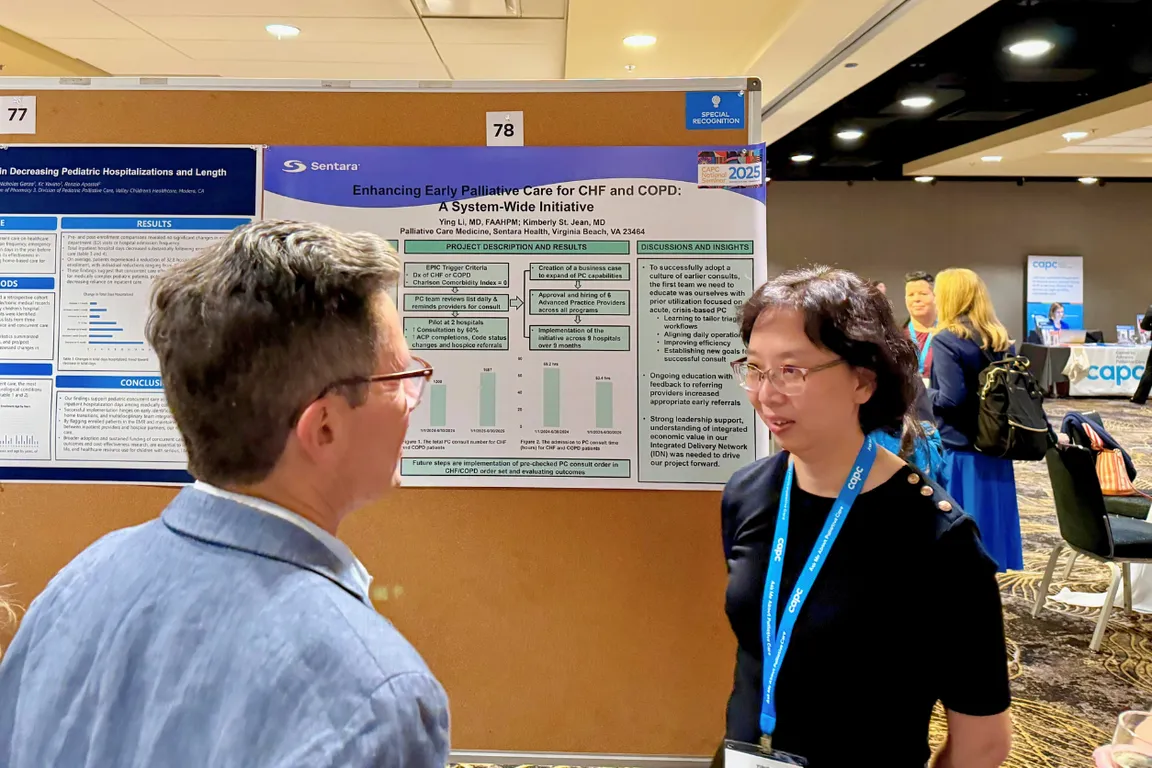
Community Health Workers (CHWs) Enhance Support for Underserved Patients
A quality improvement project at Vitas Healthcare examined how palliative-trained CHWs improve care for marginalized patients with chronic or serious illnesses by addressing social determinants of health (SDOH) and facilitating access to palliative and hospice services. Across 310 home visits for 104 patients in Chicago and Philadelphia, CHWs supported goals of care conversations, coordinated services like transportation, food, and durable medical equipment (DME), and escalated health concerns to clinical providers. Their involvement led to meaningful care interventions and improved patient-caregiver communication. CHWs serve as vital connectors by building rapport with patients/caregivers, identifying gaps in care, and reducing unnecessary hospitalizations. Their integration into palliative teams enhances quality of life and supports more equitable care delivery in populations that are traditionally underserved.
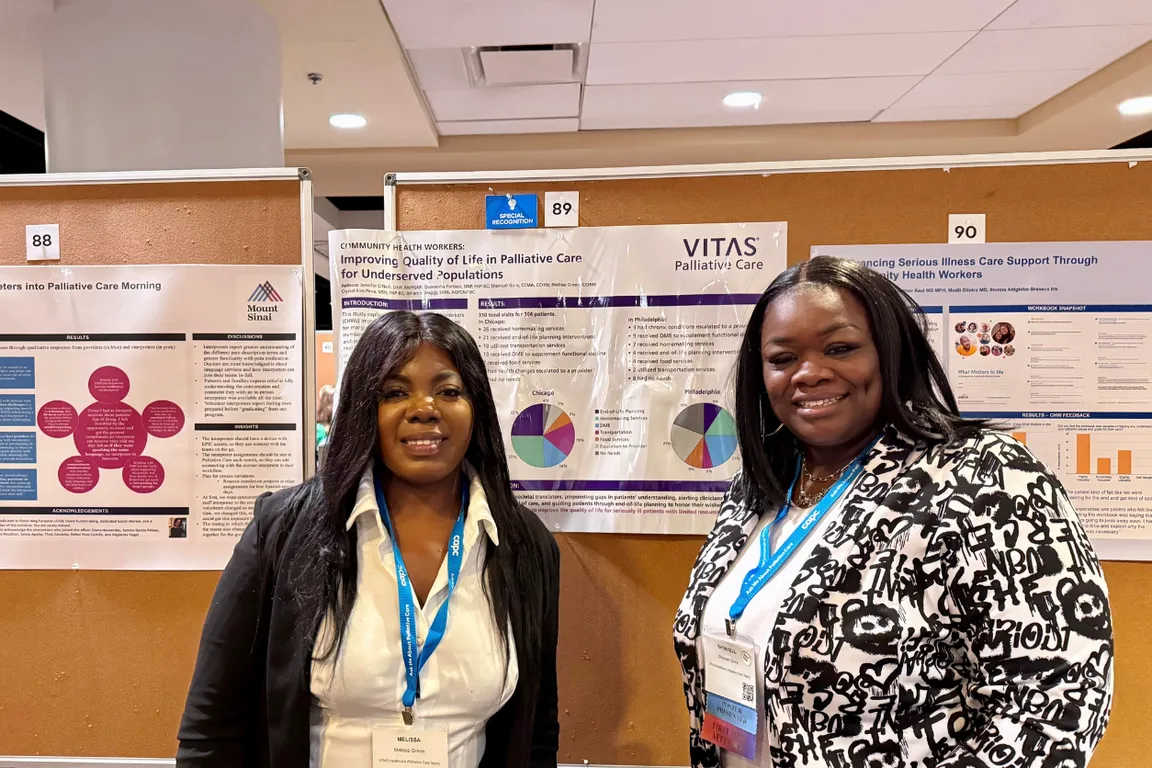
Digital Tools: Transforming Care Through Technology
The team at Emory University’s academic outpatient palliative care clinic evaluated provider experiences using Abridge, an Artificial Intelligence (AI) tool, for clinical documentation. While providers had hoped this tool would streamline workflows and increase efficiency, they found that it did not align optimally with certain elements of palliative care (e.g. nuanced of advance care planning conversations, or capturing important psychosocial details). Feedback from five experienced clinicians revealed concerns about accuracy, ethical implications, and loss of personal voice. The consensus: AI tools must be tailored to the nuances of palliative care before widespread adoption.
Predictive Power: Using Algorithms to Scale Palliative Care
To reach appropriate patients and secure additional resources for palliative care program expansion to meet the need, Wellstar Health integrated Epic’s mortality risk algorithm to identify high-need patients and predict consult volumes. The score prompted timely palliative consults, increasing monthly consults from 57 to 72, and ranking the team’s clinician in the 90th percentile for organizational productivity. By estimating the number of missed high-risk patients and applying validated cost savings figures per case, the team projected an additional 144 consults and $323,000 in savings—leading to leadership approval to hire a second physician. This data-driven approach helped demonstrate a return on investment (ROI) and secure C-suite support. The initiative highlights how leveraging objective metrics can validate unmet needs, support strategic growth, and empower palliative leaders to advocate effectively for resources.
“Every poster tells a story, and these posters tell a story about moving the palliative care field forward.”
Systems Innovation for Better Patient Outcomes
Improving What Matters: Mapping How We Measure Patient-Centered Care
Goal-concordant care, defined as aligning treatment with patient priorities, is prerequisite for high-quality care in serious illness. However, there is no standardized way to measure goal alignment. Palliative care leaders across six health institutions in Massachusetts (Brigham and Women's Hospital, Massachusetts General Hospital, New England Institute for Clinical Research, University of Massachusetts Chan Medical School, Harvard Medical School, and Dana-Farber Cancer Institute) completed a scoping review including 63 studies and 44 unique measures to identify how goal concordance is assessed across patient and caregiver reports. They found significant variations in frameworks and terminology used in the reports. The most common measurement framework paired “patient preferences” with “outcome achievement”. Findings from their scoping review highlight the urgent need for validated standardized measures to support quality improvement and value-based care initiatives.
Missed Connections: Identifying Gaps in Specialty Palliative Care Integration
A retrospective quality improvement study by the Virginia Commonwealth University Health System team reviewed more than 130 hospital cases with Do Not Attempt Resuscitation (DNAR)/Comfort Care orders, but no specialty palliative care (SPC) consults. This project aimed to assess how generalists or primary care providers manage transitions to comfort care. Findings revealed gaps in documentation of goals of care, symptom burden, and advance care planning. Just over seventy-five percent of the documentation did not mention specialty palliative care, and 14.6% received treatments misaligned with comfort-focused care. The project identified opportunities for improvement via standardized documentation templates, improved advance care planning practices, broad-based palliative care education, and reduced use of medically unnecessary interventions.
Cultivating Compassionate Clinicians and Developing a Resilient Workforce
Immersive Supportive Care for Medical Students
Chesapeake Regional Healthcare, in partnership with Liberty University College of Osteopathic Medicine, launched an innovative medical student rotation focused on community-based supportive care. The program offers immersive, hands-on experience in the following service lines: palliative care, home health services, clinical ethics advanced care planning, mobile health outreach, and hospice. Built on an interdisciplinary preceptorship model where, instead of learning from just one type of provider (e.g., a physician), trainees gain insights and guidance from a range of experts across disciplines. This rotation equips students with real-world skills, a holistic perspective, and a deeper understanding of compassionate, patient-centered care across diverse settings.
Shaping Future Physicians: Palliative Care Education in Residency
Advancing palliative care education by embedding it into the family medicine residency program is the approach taken at The University of Texas at Austin Dell Medical School. Residents gain exposure to core palliative principles and practices via an elective rotation and longitudinal curriculum, informed by CAPC’s clinical resources, existing institutional training models, and resident feedback on knowledge gaps. The goal of this project is to increase awareness of palliative care and inspire interest in fellowship pathways. This initiative is shaping a new generation of family physicians equipped to deliver compassionate, high-quality, patient-centered care across settings.
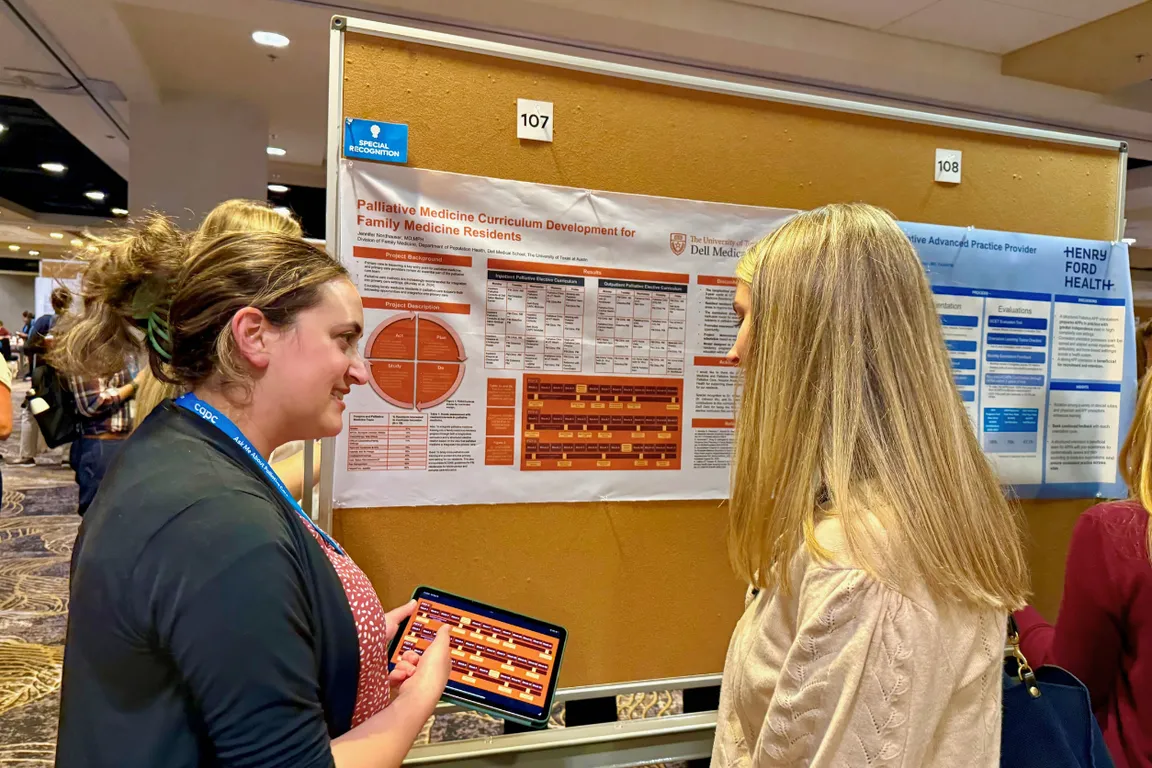
Empowering Nurses and Elevating Team Culture
At Lower Cape Fear LifeCare, two bold initiatives are transforming palliative care delivery. One is enabling experienced Registered Nurses (RNs) to practice at the top of their licenses to support patients’ palliative care needs, and the other is prioritizing team resilience and performance through strategic investment in peer support and staff well-being.
- By embedding palliative-trained nurses in key hospital units, RNs led symptom assessments, guided advance care planning, and served as care navigators, bridging communication across teams. This intentional approach resulted in increases in consults, provider engagement, and satisfaction.
- Fostering a supportive culture through targeted staff education, buddy-system, and resource reallocation made a meaningful impact. The organization saw historic lows in turnover and absenteeism; significant improvements in employee engagement and leadership scores; increased collaboration, peer recognition, and improved patient care metrics.
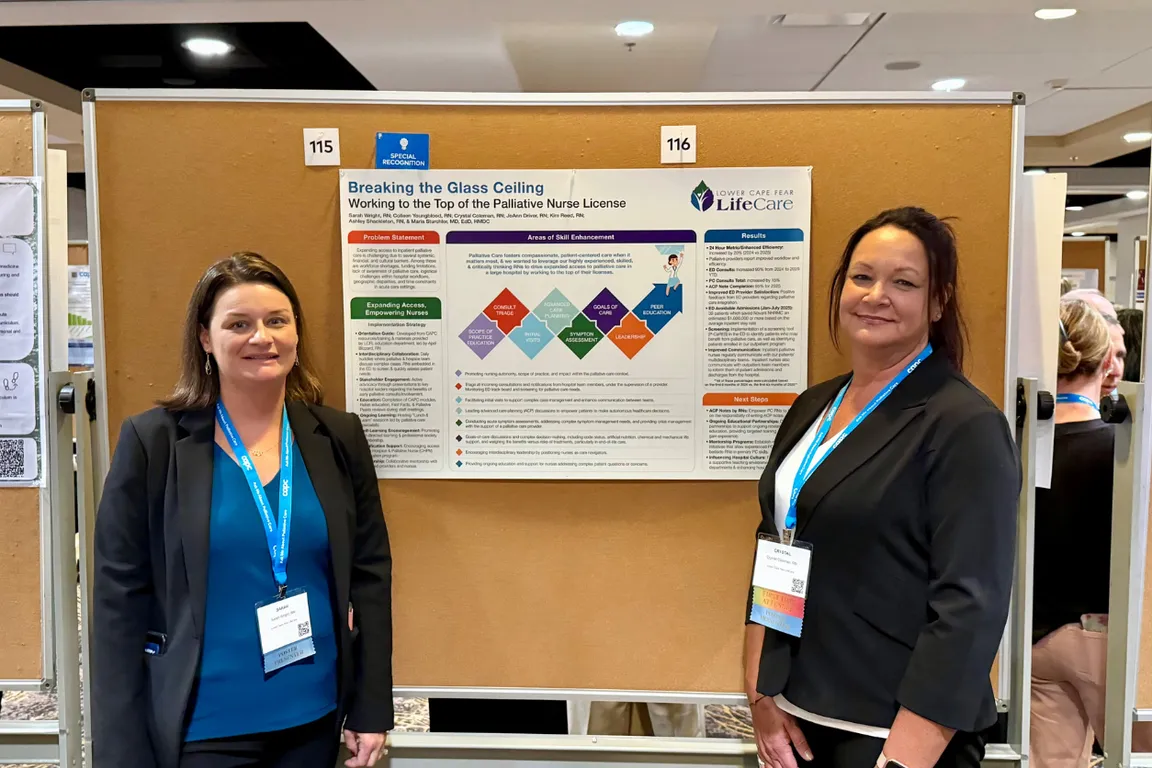
A Collective Step Forward in Serious Illness Care
These posters provided Seminar attendees with a powerful moment to reflect on how far the field has come. The sophistication and impact of these projects demonstrate the evolution of palliative care innovation, from grassroots team efforts to broad system-level collaborations. Each initiative offers scalable solutions and reflects a deep commitment to improving care for people with serious illnesses.
As the field continues to grow, these examples remind us that progress in palliative care is not only possible—it is happening all the time. We look forward to even more groundbreaking interventions at the 2027 CAPC National Seminar!

Be the first to read articles from the field (and beyond), access new resources, and register for upcoming events.
SubscribeEdited by Melissa Baron. Clinical review by Andrew Esch, MD, MBA.
